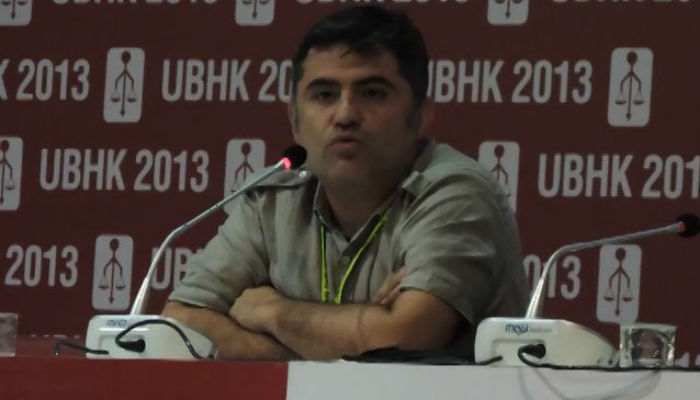While officials from the Justice and Development Party (AKP) have begun to set a date for a possible referendum on the country’s switch to a presidential system of governance, a prominent jurist has said it would be wrong to ask people their view on a specific issue at a time when there is so much censorship in the press.
“In a place where the press is under so much pressure and censorship and nobody feels protected by the law, how an earth do you think you will get a healthy outcome when you pose something like this to the public?” said Kerem Altıparmak, an associate professor in the political sciences faculty of Ankara University.
His remarks were made in an interview published by the Cumhuriyet daily on Monday.
According to Altıparmak, the circumstances in Turkey today are worse than those before last year’s Nov.1 general elections when opposition parties were deprived of the means to wage an effective election campaign.
“This is a period when it is impossible for opposition leaders to speak on TV. So, when a referendum is held, will it not be between Erdoğan’s supporters and opponents? Under these circumstances, how will Erdoğan’s opponents make their voices heard? In which media group?” asked Altıparmak.
Turkey survived a military coup attempt on July 15 that claimed the lives of more than 240 people and injured a thousand others. Dozens of media outlets that were critical have been closed down, and scores of journalists have been jailed by the government since the coup attempt.
The Turkish government declared a state of emergency in the aftermath of the failed coup, which has enabled it to issue decrees having the force of the law. The closure of the media outlets has been made through such decrees.
Altıparmak said at a time when all the critical media outlets have been closed down in Turkey, it would be wrong to see human rights violations in the country covered by pro-government media outlets.
“Will the Hürriyet newspaper do that?” he asked.
Hürriyet, which is the flagship newspaper of the Doğan Media Group, has been attracting growing criticism for turning into a government mouthpiece.
Earlier this month Nationalist Movement Party (MHP) leader Devlet Bahçeli sparked a fresh debate over the introduction of an executive presidency in Turkey when he said there was a de facto situation concerning Turkey’s method of governance and that President Erdoğan was acting like an executive president although his post is largely ceremonial. Bahçeli said the situation needs to be resolved.
The AKP, which has 317 deputies in Parliament, needs the support of at least 13 more deputies from opposition parties to take a constitutional amendment on a switch to an executive presidency to referendum. Currently, there are 133 deputies from the Republican People’s Party (CHP), 59 from the pro-Kurdish Peoples’ Democratic Party (HDP), 40 deputies from the MHP and one independent in the Turkish Parliament.
AKP officials say a referendum could be held in April.
The post of the president is largely ceremonial in Turkey; however, President Erdoğan has been acting as an executive president since his election to the top state post in August 2014. Erdoğan is a strong supporter of a switch to the presidential system. Yet, critics say Erdoğan wants a “Turkish style” executive presidency without checks and balances, one that is aimed at creating one-man rule.



